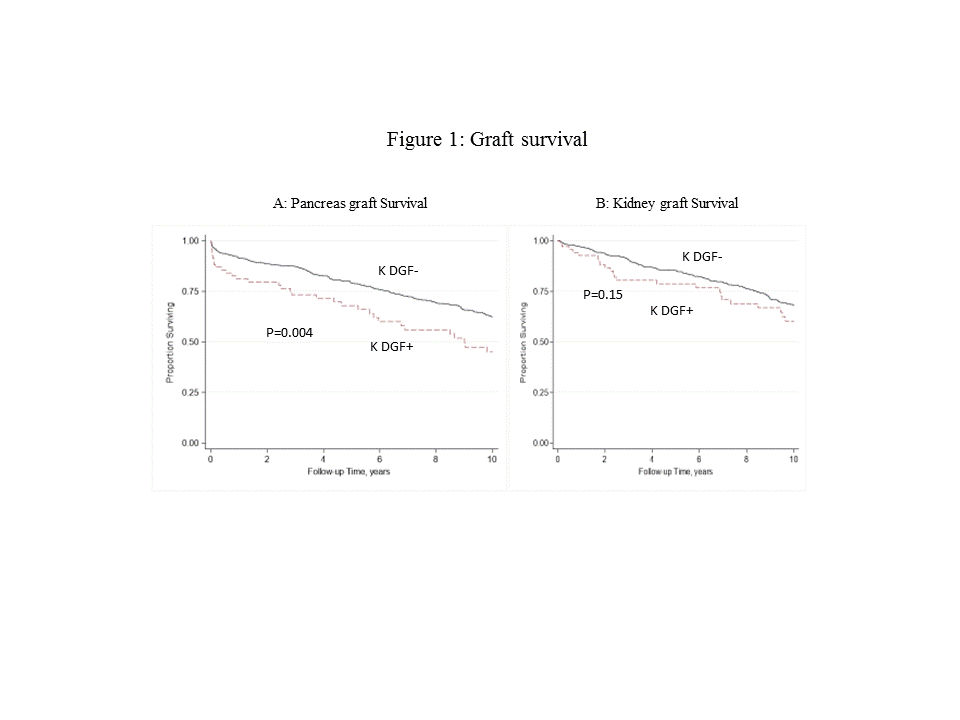Delayed Kidney Graft Function in Simultaneous Pancreas-Kidney Transplant Recipients is Associated with Pancreas Allograft Failure
University of Wisconsin, Madison, WI
Meeting: 2020 American Transplant Congress
Abstract number: C-326
Keywords: Graft failure, Pancreas transplantation
Session Information
Session Name: Poster Session C: Pancreas and Islet: All Topics
Session Type: Poster Session
Date: Saturday, May 30, 2020
Session Time: 3:15pm-4:00pm
 Presentation Time: 3:30pm-4:00pm
Presentation Time: 3:30pm-4:00pm
Location: Virtual
*Purpose: Delayed graft function (DGF) is a common complication associated with significant untoward effects in kidney-alone transplantation. The incidence and outcomes following kidney delayed graft function (K-DGF) among patients undergoing simultaneous pancreas-kidney transplantation (SPK) are less certain.
*Methods: We analyzed SPK recipients transplanted at our center between 01/1994 and 12/2017 who had post-transplant DGF. Patients not yet on dialysis (pre-emptive SPK transplants) or early kidney graft failure due to thrombosis were excluded. Risk factors for K-DGF and its association with pancreas and kidney graft failure were outcomes of interest.
*Results: A total of 632 recipients fulfilled the selection criteria, including 69 with DGF (DGF+) and 563 without (DGF-). Multivariate analyses showed a significantly higher rate of DGF in recipients of organs from older donors (HR:1.44, 95% 1.13-1.82, p=0.003) and after donation after circulatory death (DCD) (HR:6.38, 95% 3.38-12.04, p<0.001). Other baseline donor and recipient characteristics were similar between DGF+ and DGF- recipients. K-DGF was associated with pancreas graft failure in bivariate analysis (Figure 1A; p=0.004). Multivariate analyses confirmed K-DGF (HR: 1.53, 95% CI, 1.01-2.32, p=0.04) as a risk for pancreas graft loss, as well as older donors (HR: 1.22, 95% CI, 1.12-1.43, p<0.001), and Africcan American recipients (HR: 2.52, 95% CI, 1.21-5.23). Analyses of the number and timing of post-transplant pancreas graft losses showed there were 39 graft failures within 90 days of transplant, of which 9 occured in the DGF+ group ( 58.0/100 person yrs) vs 30 in the DGF- group (22.3/100 person yrs; p=0.02). The causes of early pancreas graft losses in the DGF group [thrombosis (n=3), leak (n=3), bleeding (n=2), rejection (n=1)], were no different than the DGF- group. Interestingly, the rates pancreas graft loss after 90 days were not statistically significantly different between the two groups. In addition, DGF was not associated with kidney graft failure (Figure 1B).
*Conclusions: In this single-center, retrospective analysis of SPK transplantation, we found K-DGF to be a significant risk factor for pancreas graft failure but not kidney graft failure. The major risk period is early (<90 days) post-transplant. Further analyses are needed to more clearly discern the mechanisms underlying the early risk of pancreas graft losses but appears associated with organs from older donors.
To cite this abstract in AMA style:
Parajuli S, Muth B, Astor BC, Redfield RR, Mandelbrot D, Odorico J, Djamali A, Kaufman D. Delayed Kidney Graft Function in Simultaneous Pancreas-Kidney Transplant Recipients is Associated with Pancreas Allograft Failure [abstract]. Am J Transplant. 2020; 20 (suppl 3). https://atcmeetingabstracts.com/abstract/delayed-kidney-graft-function-in-simultaneous-pancreas-kidney-transplant-recipients-is-associated-with-pancreas-allograft-failure/. Accessed February 27, 2026.« Back to 2020 American Transplant Congress

